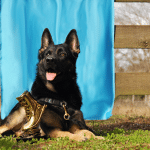At Guardian Angels Medical Service Dogs, all the dogs go through the same training. But depending on whether it is a dog from our breeding program or a rescue dog, sometimes different things show up during training, and we never force a dog to do something it doesn’t want to do.
There are a lot of different training methods and techniques that others might practice, but we do not. Either the dog is happy and joyful to work with us, or maybe the dog is not going to make the program if he or she doesn’t enjoy what we do.
We like to explain to people that being a service dog is like being a rocket scientist in the human world. A service dog is the rocket scientist in the dog world, so not every dog can make it as a service dog. They must have the nerve and the courage to encounter scary situations and still be able to manage their behavior and alert to their recipient’s needs at least 90% of the time or more.
Why Would a Dog Not Make it Through the Program?
If a dog is not going to make it through the program, it’s usually because they aren’t comfortable working in public. There are many scary things for a dog out there, such as going into an airport full of people or a grocery store with things that are different like the suction on the doors or the blower in the refrigerator section. Sometimes those are scary things for some dogs.
If they can’t desensitize and get comfortable with those things, they may not make it through the program. We start slow with public access and build up, but if they just don’t have the temperament to want to enjoy going out with their recipients and encounter these things without being upset by them, then they may be career changed.
That is one of the things that may eliminate a dog from the program. Another thing is if they become too focused on other dogs. Unfortunately, this tends to happen after a dog is paired because there are so many inappropriate dogs in public that are either imposters or are improperly trained service dogs. Our service dogs are frequently attacked by other dogs.
Once this happens, it often changes the service dog psychologically, so when they encounter another dog in public, they bristle up, they bark, and they lunge forward like they are going to be aggressive with the other dog. In actuality, the service dog is afraid and takes on this defensive posture so he doesn’t get attacked again. This is a very serious situation since service dogs are very expensive. Once attacked by another dog, there is the possibility that he’ll have to be retired from service if this defensive behavior cannot be corrected. Everything, all the years of training, the investment, and so forth that have gone into him has just been ruined.
Weird things can happen in public. We had a young dog who was working in a store with their handler when a little boy who was not under control by his parents come rushing over to the dog, screaming, yelling, flailing, and hit the dog right across the face. It terrified the dog, and he started barking at the child. He continued to bark at children every time he saw them until they took him out of there. It totally terrified the dog because nothing like that had ever happened to him before. Fortunately, we were able to work with desensitizing the dog immediately and work through what could have been a career ending event.
Things environmentally can go wrong, or maybe the dog didn’t like being in public in the first place, but it’s usually a public issue that causes the dog to fail the program, unless it’s medical, which very rarely happens to us. We are very lucky in that way.
If we do have a dog that has a medical problem, we retire that dog into a forever home, as we’re not going to put that burden on a recipient.
All of our dogs have the intelligence, the work ethic, and the ability to do the things we are teaching them so where a problem typically shows up is later in the training program when we find out they are not comfortable in public or some very negative event happens to frighten them that now becomes a problem to overcome or we can’t overcome that at all.
What Happens to the Dogs Who Don’t Make it Through the Program?
In the instance that we have a dog that does make it through the program for any reason, we go through a very serious process to find the dog the most appropriate home. We feel like whether we brought this dog into the world through our breeding program or we rescued this dog from a kill shelter, we have taken responsibility for this dog’s life, so we are going to continue to ensure he or she has the right life, the right home.
There is an application process for people that are interested in adopting one of our dogs that do not make it through the program. Once they go through our adoption process and we have thoroughly checked them out, we will introduce them to the dog. We make sure it’s a good match. We ask questions such as:
- Do they have other pets at home?
- Do they have a fenced-in yard?
- Do they work all day, or are they retired or work from home?
- Do they have children? If so, what are the ages?
There are a lot of variables that go into the adoption process, just like we would for pairing the dog with the recipient. Every dog is not right for every person because they all have different personalities, likes/dislikes, and energy levels.
We make sure that it’s a good match for any dog we put up for adoption after a career change from the program. We frequently hear back from the people who adopted our career change dogs, and they say, “Oh my gosh, this dog is fantastic and is so well-trained. Why did you ever cut them from your program?” But of course, they are not allowed to take the dog out in public, and that’s usually the reason.
They’re great at everything else, but they are not happy working in public, and therefore they can’t be a service dog, so we have to give them a career change.
Interested in Adopting One of Our Dogs? Apply Today!
Visit our application page to begin the process of adopting the occasional service dog who has been career changed and needs a forever home.
- How to Take Advantage of the CTU Patriot Scholarship - April 5, 2024
- Benefits of Service Dogs for Veterans - April 3, 2024
- The Art of Matching: How We Pair Service Dogs - March 19, 2024





